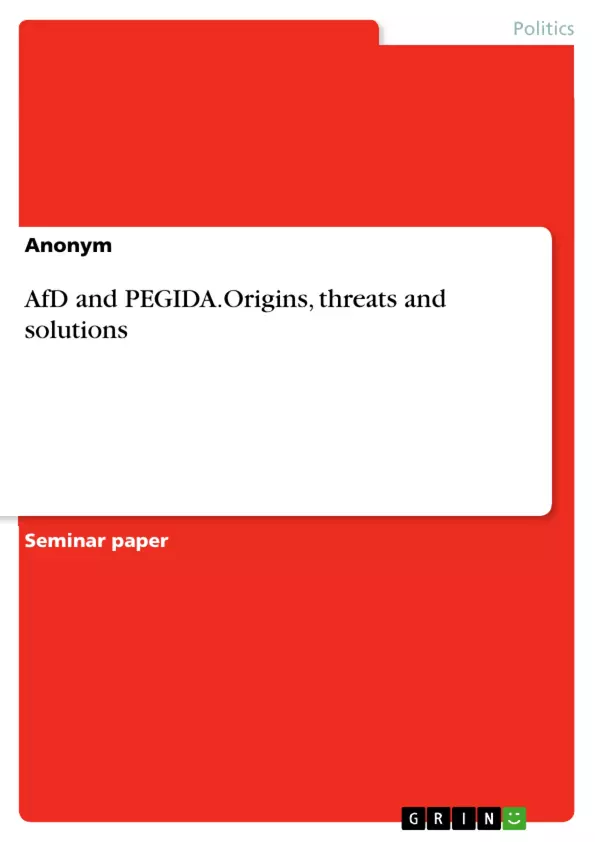“Islam does not belong to Germany.” This statement, which is taken out of the Alternative for Germany’s (AfD) party platform, conflicts with 4.89% of the German population being Muslims as of 2012. What makes the AfD as well as the protest movement “Patriotic Europeans Against the Islamisation of the West” (PEGIDA) believe that the religion of about 5% of the population does not belong to Germany? How do they even get to a statement like that in a country that has religious freedom as part of its Grundgesetz?
On March 13, 2016 three states elected their state parliaments. The AfD reached between 12.6% and 24.3% of the votes. What makes the anti-Islam and anti-refugee rhetoric so appealing? Where is the frustration coming from?
While the AfD celebrates their election victories and PEGIDA still has four-digit turnouts, the violence against Muslim individuals and communities increases. In the first half of 2015 alone, 23 Mosques were attacked. The crime rate against Muslim individuals remains unclear since the statistics of the police record anti-Muslim as a distinct category.
The urgency of the subject is clear. In order to think about ways of dealing with the AfD as well as PEGIDA, the following paper will deal with the origins of the protest movement and the party as well as their positions and opinions regarding Islam and Christian-Muslim relations. I will end discussing the threats that come from these movements and look into possible solutions. My main thesis for the paper is that the threat to German culture is not Islam but anti-diversity movements like PEGIDA and AfD. I base this on the lessons Germany (should have) learned from its Third Reich history and on European values.
The first part of the paper has an historical approach, the second part focuses on political demands and the third part will be an attempt to find ways to better the situation.
Inhaltsverzeichnis (Table of Contents)
- Introduction
- Origins of the Alternative für Deutschland
- Origins of PEGIDA
- Origins of Islamophobia in the movements
- How PEGIDA appropriates historic events
- The Alternative für Deutschland's positions
- PEGIDA's positions
- Threats to Germany's culture and possible solutions
Zielsetzung und Themenschwerpunkte (Objectives and Key Themes)
This paper examines the origins, positions, and threats posed by the AfD and PEGIDA, two prominent anti-Islam and anti-refugee movements in Germany. It aims to understand the reasoning behind their beliefs and actions, particularly regarding Islam and Christian-Muslim relations. The paper also explores possible solutions to mitigate the negative impacts of these movements.
- Origins and development of the AfD and PEGIDA
- Analysis of the AfD and PEGIDA's positions on Islam and Christian-Muslim relations
- Assessment of the threats posed by these movements to German culture and society
- Exploration of potential solutions to counter the influence of these movements
- Discussion of the role of historical lessons and European values in addressing the issue of anti-diversity movements
Zusammenfassung der Kapitel (Chapter Summaries)
- Introduction: This chapter sets the stage by introducing the AfD and PEGIDA, highlighting their anti-Islam stance, and emphasizing the urgency of addressing their influence in light of their growing presence and the increasing violence against Muslims.
- Origins of the Alternative für Deutschland: This chapter traces the AfD's formation, outlining its initial focus on the euro crisis and subsequent shift towards broader issues like immigration, education, and family. The chapter describes the internal conflicts and power struggles within the party and the resulting shift towards a more nationalistic stance.
- Origins of PEGIDA: This chapter explores the founding of PEGIDA in Dresden, Germany, highlighting its origins in a closed social media group and its evolving name. It describes the format of PEGIDA protests, including the significance of the chosen day, rituals, and slogans. The chapter also discusses the growth of PEGIDA and its branches, noting the high turnout of participants and the subsequent internal conflicts leading to a split within the movement.
- Origins of Islamophobia in the movements: This chapter examines the underlying reasons for the AfD's and PEGIDA's anti-Islam sentiments. It considers the potential for protest voting in the AfD's case and the diverse motivations of PEGIDA participants. It further discusses the condoning of anti-Islamic behavior within PEGIDA and the significance of anti-Muslim rhetoric used by its members.
Schlüsselwörter (Keywords)
The main keywords and focus topics of the text include AfD, PEGIDA, Islamophobia, anti-Islam, anti-refugee, Christian-Muslim relations, German culture, diversity, European values, historical lessons, protest movements, political Islam, and the Third Reich.
- Citar trabajo
- Anonym (Autor), 2016, AfD and PEGIDA.Origins, threats and solutions, Múnich, GRIN Verlag, https://www.grin.com/document/335905



